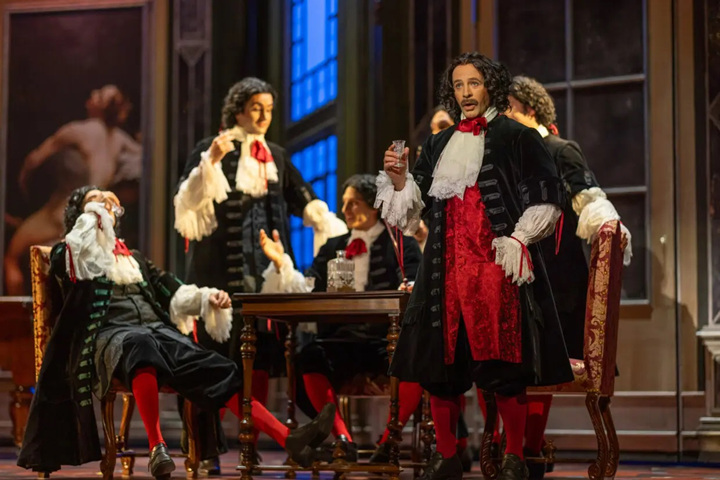| Opera Reviews | 2 June 2024 |
A charming production making an excellent case for baroque operaby Catriona Graham |
|
Handel: Flavio |
|
 |
|
|
It is an everyday tale of court life. Handel’s Flavio, Re di Longobardi, first performed in 1723, is both a biting political satire (if the politics being satirised are a tad lost on an 21st century audience) and a soap-opera of family and sexual relationships played out in full view of their nearest and dearest. In Max Emanuel Cencic’s production for the Bayreuth Baroque Opera Festival, it could be Flavio the mini-series, served up as a box-set. Helmut Stürmer’s set is the star. Like a giant folding screen, its panels of window, door, painting, snake across and around the stage between scenes, creating the suite of state rooms in which the action takes place, effectively lit by Romain de Lagarde. The opera is one of those where the title role turns out to be a bit-part, although Rémy Brès-Feuillet’s priapic young king is entertaining, enthusiastically breaching the fourth wall to conduct the orchestra, and whistling the play-out of one of his arias with the other young men of his court. His youth is his saving grace – such behaviour in an older man would just be too sleazy. His court is one of levées, of court attendance when he beds the queen or has a bath. The interlocking stories are played out during card games and royal audiences. Lotario (Sreten Manojlovic), having arranged the marriage of his daughter Emilia to Guido the son of his rival Ugone (Fabio Trümpy), is incensed when his rival is awarded the governorship of Britannia, albeit so that Flavio can have his way with Ugone’s daughter Teodata, now appointed as one of the queen’s ladies. What could possibly go wrong? Julia Lezhneva is a spirited Emilia, with an outstanding gift for ornamentation; this is no exhibition of technique (well, it is, actually) but integrated into the drama of the aria as laughter, sobbing, hyper-ventilating hysterics, a fit of the giggles. As her lover Guido, Cencic also ranges through the emotions, from unabashed joy with Emilia to despair, when faced with the duty to avenge Lotario’s insult to his father, even more so when he inadvertently kills Lotario. It’s a nice touch by costume designer Corina Grämosteanu that Guido is dressed no differently from the other young gentlemen hanging around the court. The other pair of lovers – the comic relief – are Teodata, who is carrying on with the king’s adjutant, Vitige, behind her father’s back. Monika Jagerova is lively, but appalled when she catches the eye of the king. Yuriy Mynenko’s distress is acute when, as expected, Teodata ends up in Flavio’s four-poster with a (lively) fringe on top. Where Cencic’s direction makes this production special is in filling the stage with non-singing ladies and gentlemen of the court both as observers and participators in the action. For example, the young gentlemen have the duty of arranging the furniture for the action, be it setting out the card tables, or bringing Flavio his bath. The Queen (Eirini Petraki) (who Flavio regards as repulsive) and her dwarf companion (Mick Morris Mehnert) make a touching pair with a convincing – and mute - side plot. The acting of the court is superb, their laughter and chatter create an atmospheric background to the main action and singing, yet never displace it. There’s even a piece of on-stage entertainment when Filippa Kaye, as one of the court ladies, sings Monteverdi’s Pur ti miro. Plus the headdress of the duenna-like Mother Superior is quite something. Benjamin Bayl conducts Concerto Köln with aplomb, and the instrumental passages as the scene changes are delightful. This is a charming performance and, for any first-timers in the audience, an excellent introduction to baroque opera. |
|
Photo © Clemens Manser |
|







